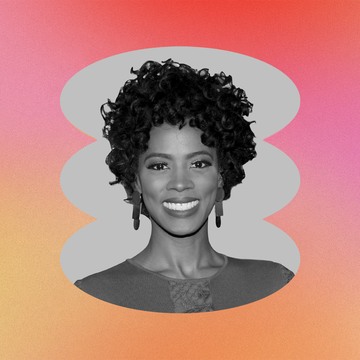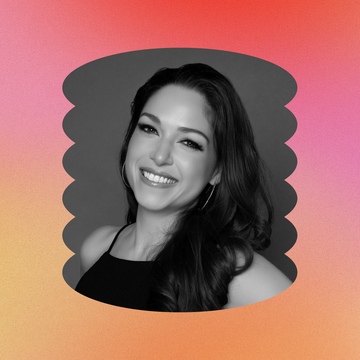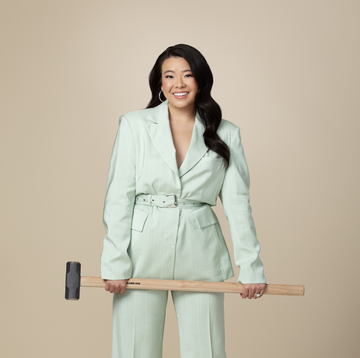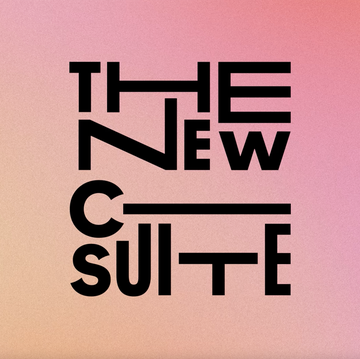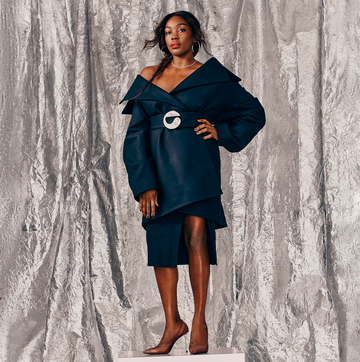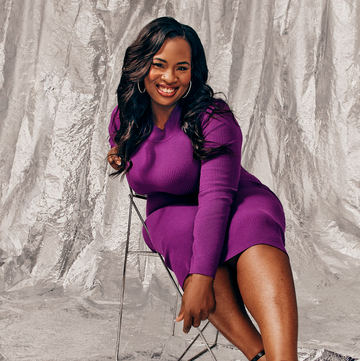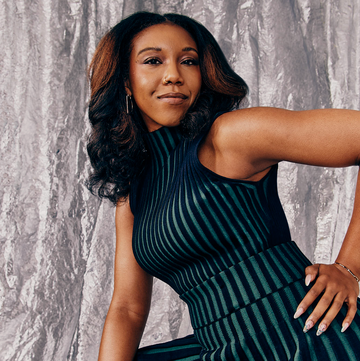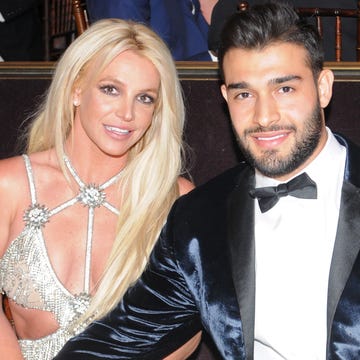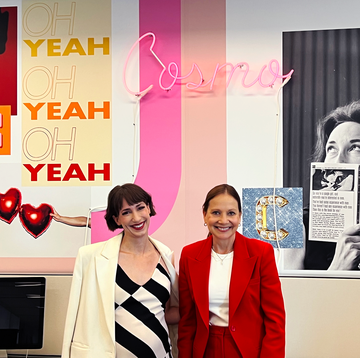For Gesche Haas, 30, a tech entrepreneur in New York, it was an out-of-the-blue, late-night e-mail from a male coworker: "Take off your underwear, put it in a bag, and leave it on my desk."
For Tiffany Kirk, 25, a bartender in Houston, it was a comment from a male customer: "I know where to get some really good coke if you want to do a line off my dick."
And for Joanna Garcia, 28, a bank teller at a Wells Fargo branch in Reno, Nevada, it was a female supervisor allegedly talking nonstop about breasts and penises and graphically describing sexual encounters. "It didn't feel like a bank," says Garcia. "It felt almost like a nightclub."
Garcia also alleged that her supervisor (whom she asked not to be named) showed her images of male genitalia and suggested she and other tellers wear provocative clothes to attract customers, according to a lawsuit filed on her behalf by the U.S. Equal Employment Opportunity Commission (EEOC), the federal agency that handles workplace discrimination. "It was just a hostile, sexual environment," says Garcia. "As a person, it really degrades you."
This is what sexual harassment looks like in 2015, when there are more ways to creep on someone at work than ever before—and perhaps, more confusion about what's off-limits. As the workplace starts to feel more laid-back (your boss is your Facebook friend, your coworkers text you after hours, everyone meets for Whiskey Thursdays…at the office), more subtle forms of sexual harassment are taking a psychological and economic toll on women across the country.
"With the advent of social media, there is a much more casual relationship between coworkers and supervisors, and that absolutely creates more opportunity for people to cross the line between professional and unprofessional conduct," says David Lowe, a San Francisco employment lawyer. Lowe represented Tinder's former marketing vice president Whitney Wolfe, who last year sued the dating app for sexual harassment. Wolfe claimed a Tinder executive, whom she briefly dated, stripped her of her cofounder title, saying, according to her civil complaint, that she was a "24-year-old girl" and it would be "slutty" to be the female founder of a hookup app. He subjected Wolfe, her lawsuit alleged, to "sexist, racist, and otherwise inappropriate comments, e-mails, and text messages," including calling her a "whore" in front of coworkers at a company party. The impact on her was clear from the texts she sent a friend: "The shit he says…makes me wanna kill myself," Wolfe wrote, according to her complaint. "He's so low and nasty, I might quit." The exec later resigned, and Wolfe, who declined to comment, settled with Tinder for an undisclosed amount. The company did not admit wrongdoing, and a spokeswoman declined to comment.
Despite women's many advancements in the career space—women make up almost half the workforce and outearn men in an estimated 40 percent of American households—sexual harassment didn't fade away with the Mad Men era. Over the past 15 years, the number of sexual harassment complaints filed with the EEOC has held steady between around 7,000 and 9,000 (which is to say nothing of the unreported cases). Some people don't want to talk about it. One young female CEO contacted for this story e-mailed to say she "isn't a proponent of the message that women are sexually harassed in workplaces."
But a new survey from Cosmopolitan says sexual harassment is still widespread: Roughly 1 in 3 women ages 18 to 34 has been sexually harassed at work, reveals our study of 2,235 fulltime and part-time female employees, conducted by the polling firm SurveyMonkey. The problem is at its worst in the restaurant industry, where 42 percent of women say they've experienced it, but it has also affected 36 percent of women in retail, 31 percent in science/tech, 31 percent in arts/entertainment, and 30 percent in the legal field.
Cosmopolitan's survey reveals a no-filter, say-anything workplace: Eight in 10 of those who were sexually harassed at work say it involves something said out loud. Forty-four percent of women who were sexually harassed say they've encountered unwanted touching and sexual advances. And about 1 in 4 have received lewd texts or e-mails.
Debunking the myth that it's the lecherous male boss who's most likely to sexually harass women, most women polled— 75 percent—say they were targeted by male coworkers and about half were harassed by male clients or customers, compared to 38 percent by male managers. Another 10 percent say their harasser was a female coworker. (The results exceed 100 percent because some respondents had been harassed multiple times.)
"It might be leers, gestures, or putting porn up on a computer.…There is an infinite variety of ways to make people feel uncomfortable," confirms Anne Vladeck, a New York employment and labor law attorney. Among her current clients is Leigh Castergine, a 32-year-old former New York Mets ticket executive who claims in a pending lawsuit that Mets COO Jeff Wilpon subjected her to constant criticism because he didn't approve of her having a baby as a single woman. He even once pretended to look for an engagement ring on her hand, the suit alleges. Castergine says after she complained to human resources, Wilpon fired her. The Mets said in a statement that Castergine's claims are "without merit." Wilpon denied the allegations with his own court filing, saying he treated Castergine "without regard to her gender, marital status, pregnancy, or leave."
So illicit talk and texts are flying at restaurants, retail stores, and law firms alike, according to Cosmopolitan's survey—but not everyone knows what to call it. Many people still think of sexual harassment as a quid pro quo offer of a promotion in exchange for sex. So when faced with sneakier forms of harassment— especially from a coworker, not a boss—women have a way of questioning themselves. Are you supposed to be the "cool girl" at work, shrugging off your cubemate's constant stories about fucking his hookup? Cosmo's survey confirms this confusion: Sixteen percent of women polled answered "no" when asked outright if they've been sexually harassed at work but answered "yes" to experiencing sexually explicit or sexist remarks at their jobs.
"We have a lot of people who call our hotline who aren't sure if what they're experiencing is sexual harassment," says Noreen Farrell, executive director of Equal Rights Advocates, a nonprofit civil-rights law firm. "Then they tell us they're getting persistent comments and dating requests and coworkers are calling women bitches. Nearly 100 percent of those callers are experiencing harassment." If comments single you out for being a woman—and are severe or pervasive enough—they can add up to a hostile work environment, a legal definition of harassment.
But other cases are less clear, and the professional lines are increasingly blurry. When two people who work in the same industry "meet" on Twitter and grab drinks and talk shop, one may see it as a business meeting and the other may consider it a personal hangout.
Take the case of Hannah Waters, a 27-year-old science writer, and Bora Zivkovic, the influential (now former) editor of Scientific American magazine's blog network. Waters says Zivkovic began promoting her blog posts online after they met in 2010, which she says helped launch her career. But she told friends she was disturbed by what she describes as his lingering hugs and a Twitter DM that read "I love you!!!" By 2011, he'd hired her to write for Scientific American. At a "tweetup" for science writers in New York, she says she felt uncomfortable when he gave her a rose from a street vendor and "jokingly" called her his "concubine."
Waters hesitated to call their interactions sexual harassment at first, but in 2013, she and two other writers, Monica Byrne and Kathleen Raven, wrote blog posts accusing Zivkovic of sexual harassment. "It wasn't overt, textbook, grabbing a butt, or asking me on a date," says Waters of her experience with Zivkovic, "but I felt deeply uncomfortable and sexualized and it created anxiety problems for me. I wanted to make a career as a writer on my own merit, but it felt like it wasn't my work that was being elevated."
Zivkovic, on the other hand, flatly denies he acted inappropriately toward any of the women and says the incidents they labeled harassment were misunderstandings that didn't happen in professional settings or situations. "This is a small community, and we were all friends or trying to become friends," he says. "We were all together building a new, more egalitarian world of online science writing. We all met in social settings and had drinks together. Nobody felt this was a working environment."
Zivkovic says the "concubine" comment, for example, was an "innocuous joke." He says he and Waters were smoking outside a bar when he bought a rose for his wife, who was inside. When the salesman gave him two, he says he joked—to the salesman, not Waters—"What's that, one for the wife, one for the concubine?" As for the Twitter DM, Zivkovic says the word love can convey many things, including admiration and friendship. Hugs, he notes, were common in the community.
In the aftermath of the controversy, Raven says she's more likely to call out behavior that makes her uncomfortable. "At a past job, an editor sent me some Facebook messages, saying, 'How old are you? How long have you and your husband been married? Your blouse looks nice.' I took this guy aside, and I said, 'Those comments were inappropriate, and could you please not make them?' He didn't seem happy about being confronted, but he did stop messaging me with personal questions. These are small things that most women push aside, but it was interfering with my ability to focus at work."
This is the economic consequence of verbal harassment—it can drain employees, kill productivity, and derail women's success. "If you're forced out of a job because you're sick of your boss making comments, it impacts your earnings and your ability to get promotions," notes Farrell. "People tend to leave work rather than have to put up with it."
Seventy percent of women who've been harassed did not report it, whether to a manager or an attorney, Cosmo's survey finds. Sexual harassment isn't a criminal offense (unless it involves a crime like rape or assault), but companies can be held liable under Title VII of the Civil Rights Act, a law that says you can't discriminate against someone based on their sex. A complaint can warrant a civil lawsuit against an employer and a monetary payout for damages.
But reporting bad behavior can be complicated. "Many harassers are careful to do it when nobody else is around, and that makes somebody afraid to put her word against the harasser's word," says Chicago employment attorney Aaron Maduff. And even though retaliation by management is illegal, women say it does happen— suddenly they're stuck with bad shifts or even fired from their jobs.
As awkward or intimidating as it may be, speaking out about sexual harassment is the only way to snuff it out, says Debora Bloom, a workplace consultant who advises companies on sexual harassment. "It's important to speak up to let the person know that their remarks or their touching is unwelcome," says Bloom. "I've heard from some women that there are people who engage in harassing behavior who don't seem to know that in 2015 it's not appropriate."
Sexual harassment should never be the price of a paycheck or something women need to put up with in order to get ahead. "We need to join forces and say, 'This isn't okay, let's change it,'" says Haas. "Pretending like it doesn't happen is the worst thing we could do."
See also:
How to Respond to Sexual Harassment at the Office
Survey: 1 in 3 Women Has Been Sexually Harassed at Work
3 Women Open Up About Sexual Harassment in the Workplace
This article was originally published as "He Said WHAT At Work?" in the March 2015 issue of Cosmopolitan. Click here to get the issue in the iTunes store!


